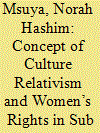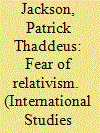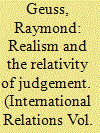| Srl | Item |
| 1 |
ID:
168252


|
|
|
|
|
| Summary/Abstract |
This article discusses the challenges of the realization of women’s rights in relation to the concept of culture relativism in sub-Saharan Africa. It examines how the concept of culture is misconstrued with a traditional hierarchy and patriarchy approach that intervenes in the realization of women’s rights in sub-Saharan African states. Many societies are concerned that the promotion of gender equality would interfere with local culture; hence they feel that gender equality should not be promoted for ethical reasons. Women have been left with the unpleasant situation of choosing between their rights or their culture. Through secondary analysis and a critical review of the literature, the article engages in the debate on cultural diversity and gender equality, to challenge the existing stereotypes in sub-Saharan African cultures. It argues that traditional and cultural practices should adhere to the values of equality and human rights. The article proposes that cultural considerations will have to yield whenever a clear conflict with human rights norms becomes apparent.
|
|
|
|
|
|
|
|
|
|
|
|
|
|
|
|
| 2 |
ID:
137602


|
|
|
|
|
| Summary/Abstract |
Although scholars toss around the word “relativism” when debating the merits of various methodological approaches in international studies, there is a lack of clarity about what it might mean to have a relativist position on the production of social-scientific knowledge. As a result, a lot of the ink spilled about the potential dangers of relativism is overblown. A little philosophical and logical clarity goes a long way towards dispelling that particular bogeyman.
|
|
|
|
|
|
|
|
|
|
|
|
|
|
|
|
| 3 |
ID:
137604


|
|
|
|
|
| Summary/Abstract |
This paper develops three basic arguments in the context of this forum: that IR theory is genuinely pluralistic though those who see only apparent pluralism have a point. That discussions of pluralism in IR often run together the claims that pluralism is intrinsically valuable and that it is instrumentally valuable, and that these two claims need to be kept separate and examined more critically than they often are. And that pluralism is not Relativism and should not be assumed to be. Finally the paper suggests that IR theory might need to take on a still further aspect of pluralism if it wishes to properly understand the implications of plurality.
|
|
|
|
|
|
|
|
|
|
|
|
|
|
|
|
| 4 |
ID:
138080


|
|
|
|
|
| Summary/Abstract |
E.H. Carr contrasts ‘realism’ with ‘utopianism’ in his major work in theorising international relations, but he ought to have contrasted it with ‘moralism’, which is a complex set of attitudes that give unwarranted priority to moral considerations in explaining and justifying human action. ‘Moralism’ is a flawed approach to politics. One should distinguish it from ‘utopianism’, which is made up of different strands, not all of which are equally problematic. One strand which has been historically important was centred around an attempt to describe and realise a perfect unchanging society, and Carr seems to have this in mind primarily when he speaks ‘utopianism’. However, there has been another strand which has focused on the social construction of ‘impossibility’ in politics, and our potential ability to undo that construction. Such utopianism is compatible with realism.
|
|
|
|
|
|
|
|
|
|
|
|
|
|
|
|